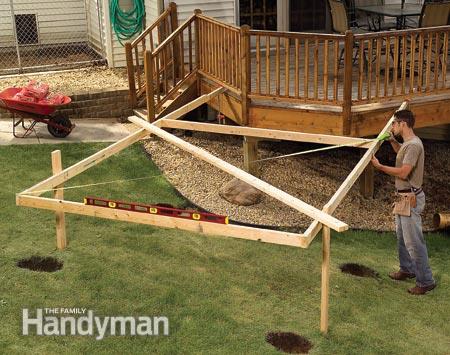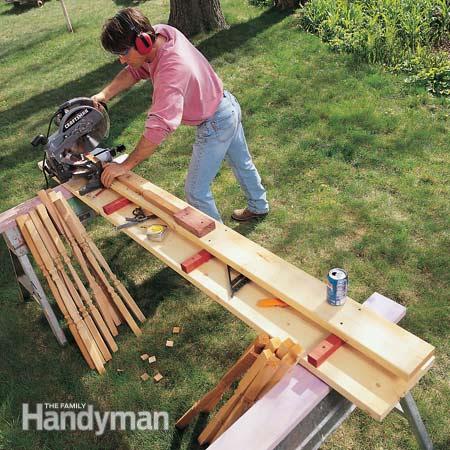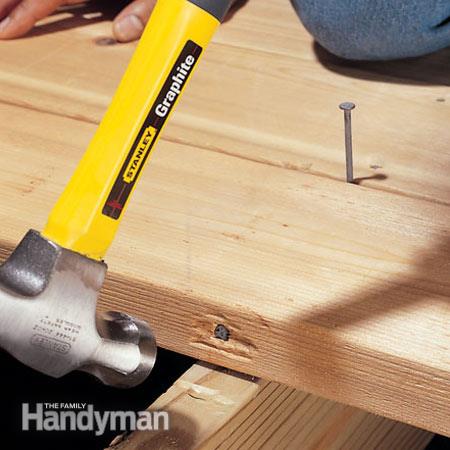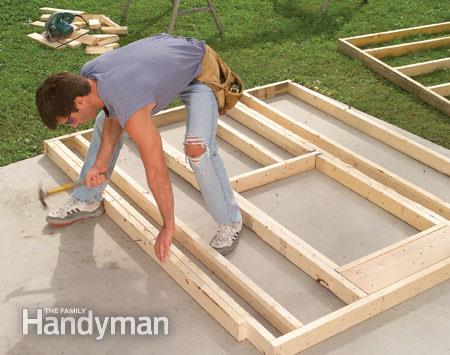Here’s Some More Of Those Great Carpentry Tricks and Tips I Found Over At The Home Handyman Site.
Strings and Stakes Work Sometimes
Strings and stakes work sometimes, but there is another way to maintain layout control for small project areas
When we used to build garbage enclosures for our commercial projects, after the gate post and bollard holes were dug, the easiest way to control the gate post, corner post and bollard post layout for the concrete pour was to build a layout template on the ground. All these posts could be set to elevation, and braced plumb before the concrete truck arrived.
Here’s a similar setup in a residential. situation.

“Use the construction lumber as a template
You see it in print and on TV everywhere—some stake and board contraption set up to hold strings to help position postholes, or lay out footings or building footprints. But most of the time, there’s a much better way. Tack together the construction lumber to outline the structure, square it up and use it as a giant template to do all your marking. Set it aside to do your digging and replace it to set the posts.”
Setup A Job Site Work Station
Things can go a lot smother and faster if you have some kind of jobsite workstation set up around your miter saw and table saw.
I have a couple of sets of stackable saw horses dedicated for this purpose. You can usually find plywood or 2x material on site to make a table top.

“Use materials on hand for this simple bench
Whether you’re working in your garage, out in the backyard building a shed or up at the in-laws’ cabin building a deck, take a few minutes and cobble together a miter saw bench, With a little creativity, you can use just about any materials you have on hand. The only custom work you’ll need to do is to rip some spacer boards to make the outfeed support the same height as the saw table. It sure beats kneeling on the grass or perching the miter saw on horses. And the bench does double duty as a super-convenient work surface too.”
The Toenail Trick
No we’re not talking about kicking your lumber pieces in place.
Driving a toenail into a lumber joint is a great way to straiten a member or move it sideways into the correct place.

“Use the toenail trick to position lumber
On my first job as a framing carpenter, I was beating on a stud to try to coax it into position. The stud just bounced back. A veteran framing carpenter walked over and drove a big nail at an angle through the edge of the stud. The last two hammer blows moved the stud into position, where it stayed. Now I use the toenail trick whenever I need to adjust stubborn lumber.”
The Easy Way To Order Framing Materials
This is a simple formula for figuring out how much framing material to buy for your walls.

“Use this formula to order framing materials
You don’t need a math degree to estimate framing materials for walls. Here’s a formula that works every time, no matter how many doors, windows or corners your walls have:
- One stud per linear foot of wall.
- Five linear feet of plate material (bottoms, tops and ties) per linear foot of wall. It’ll look like too much lumber when it arrives, but you’ll need the extra stuff for corners, window and door frames, blocking and braces. Set aside the crooked stuff for short pieces.
Learn more great construction tricks and tips at the source article. click here
Did you read the first post in this series of great carpentry tricks? – Click Here --
Carpentry Tricks and Tips - 10 Of The Greatest Carpentry Tricks You Will Find
No comments:
Post a Comment